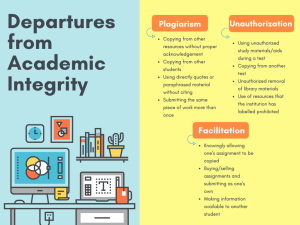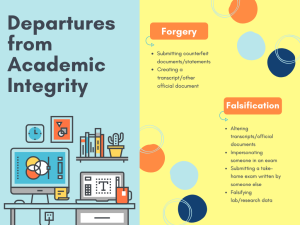Chapter 3: Post-Secondary Learning
27 Academic Integrity
Academic integrity means that you are ensuring that all the work you do and the knowledge you show on assessments (tests, exams, essays, reports, assignments, etc.) are your own. It also means that when you use information or ideas that are not your own, that you have properly cited all references. There are six values of integrity, according to the International Center for Academic Integrity (n.d.): honesty, trust, fairness, respect, responsibility, and courage. Check out this document explaining the values and how you can demonstrate them in your studies.
Read how the values of academic integrity relate to the Seven Grandfathers Teachings (PDF resource from the University of Waterloo).
Integrity is important because the value of your degree, diploma, or certificate depends on “the legitimacy of the education these students earn. A degree is valueless without integrity” (University of Waterloo, n.d.). What value is your program if anyone can cheat their way through it?
Matters of academic dishonesty are taken very seriously in post-secondary education, so it is important to understand what constitutes breaches in academic integrity. Breaches in academic integrity could result in disciplinary actions and interruptions to your studies. Each college/university will have some kind of academic integrity policy that students must adhere to. It is your responsibility to understand these expectations, so you should find that policy and read it to ensure you don’t inadvertently breach the policy.
While each school’s policy will be slightly different, most will include the following:
- A definition of academic integrity, dishonesty, plagiarism, etc.
- The expectations of students
- An explanation of the process if a student is suspected of academic dishonesty
- The associated penalties should the student be found guilty of academic dishonesty
Most students believe that academic dishonesty only includes copying text word-for-word or cheating off someone else’s work. While these are two examples of academic dishonesty, there are others that are also considered an infraction and may result in disciplinary action. Let’s take a look at some of them:


Activity: What Is Academic Integrity?
Please complete the following interactive module from York University to help deepen your understanding of academic integrity: What is Academic Integrity?
Basic Consequences of Academic Integrity
Should you be accused of academic dishonesty, there will be a process your college follows. It is important for you to know the specific process and the consequences. Penalties for academic dishonesty offences can include:
- written warning with resource links and in-person options for the student to learn more about Academic Integrity at Cambrian College;
- resubmission of the assignment;
- partial or total loss of marks on the exam/assignment in which the offence occurred;
- partial or total loss of marks for the course in which the offence occurred;
- suspension from the College for a period of 2 years (this penalty may be repeated if this is a further offence after a past suspension);
- a recommendation for cancelling a credential. A student, who is found guilty of academic misconduct after having been approved for graduation or after having a credential conferred, may lose their credential.
Cambrian College supports academic integrity and academic growth, but repeated Academic Dishonesty offences will not be tolerated.
Depending on the severity of any prior penalties (e.g., if a student has received two penalties that are not suspended from the College), a third offence of Academic Dishonesty will result in an automatic suspension from all College programs and/or courses for a period of 2 years. The student will automatically receive an F grade (0%) in each course they were registered in at the time of the suspension.
Information on Cambrian College’s policies around Academic Integrity can be found here.

